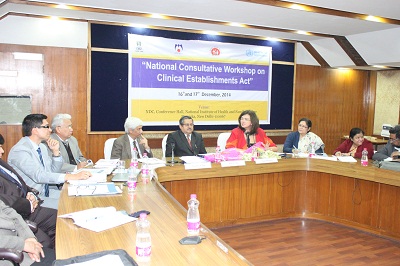
To strengthen healthcare regulation in India, a national level stakeholder consultative workshop on the Clinical Establishment Act was organized by the WHO Country Office for India in collaboration with the National Institute of Health and Family Welfare(NIHFW) and the Ministry of Health & Family Welfare (MoHFW) on 16-17 December 2014.
The two-day consultation was part of the first stage of a nationally representative study being conducted by WHO and NIHFW with an aim to understand and analyse the underlying reasons for sub-optimal uptake and implementation of Clinical Establishment Act (CEA) in India. Based upon the evidence generated from this study, plausible policy and programmatic roadmap would be developed to enhance the acceptability, uptake, systematic scale-up and effective implementation of the CEA in India so that the quality, safety, transparency of healthcare could be enhanced and patient rights safeguarded.
Speaking at the consultation, Mr Lov Verma, Secretary (H&FW), MoHFW said, “The study on Clinical Establishment Act is very timely; the findings of this study would be critical for the government to undertake necessary policy correction.”
“We are aware that the act has some problems, but a higher degree of convergence between all stakeholders is essentially the way forward for effective implementation of this act,” he added.
In her address, Dr Nata Menabde, WHO Representative to India, emphasised that good quality health care should be a right, not a privilege.
“Since health is a highly specialized field, the asymmetry of information is huge and hence it is government’s duty to protect the interests of patients by regulating the vast and heterogeneous healthcare sector and putting forth framework of accountability and transparency,” she added.
Highlighting the vital importance of regulation, Mr. K.L. Sharma, Joint Secretary Regulations, MoHFW said, “To capitalize on its demographic dividend, India needs to provide efficient and effective healthcare services to its citizens, which can only be achieved with robust regulations.”
“Effective implementation of the Clinical Establishment Act has become the “need of the hour” in view of the proposed National Health Assurance Mission,” he added.
The CEA was passed by Parliament of India in August 2010 for registration and regulation of all clinical establishments (public and private, allopathy and AYUSH institutions providing curative and/or diagnostic facilities) in the country with a view to prescribing the minimum standards of facilities and services provided by them.
The consultation was attended by senior officials from Ministry of Health & Family Welfare, Government of India, WHO, state level policy makers, private health sector hospitals, academia and civil society.
